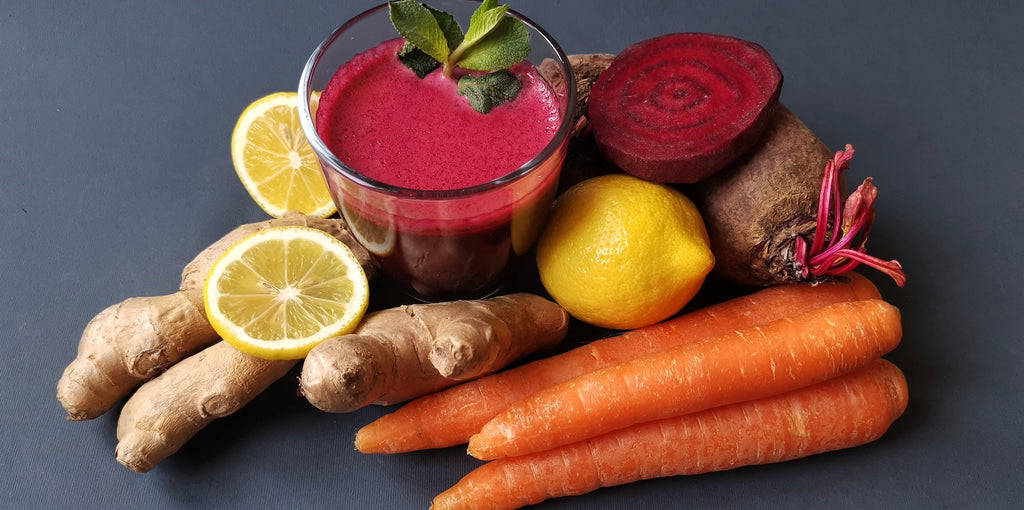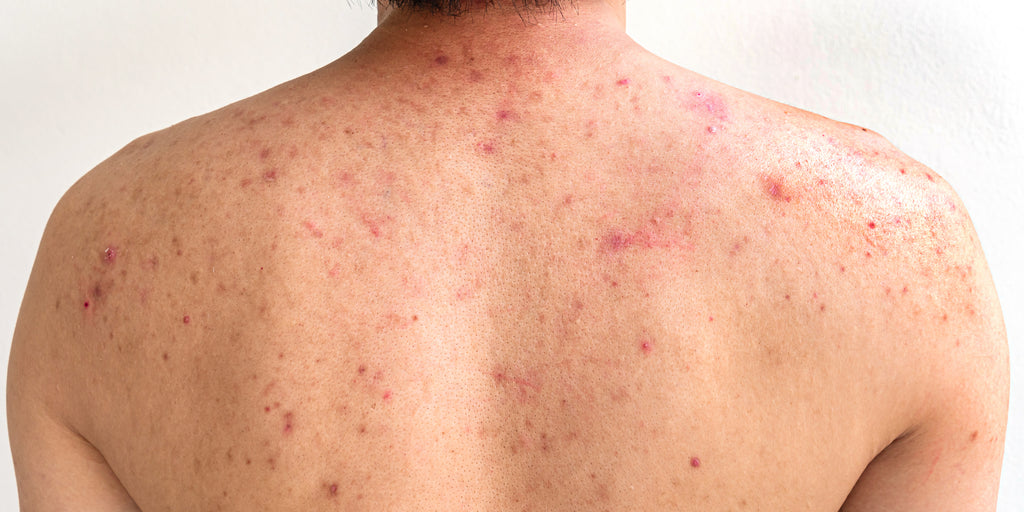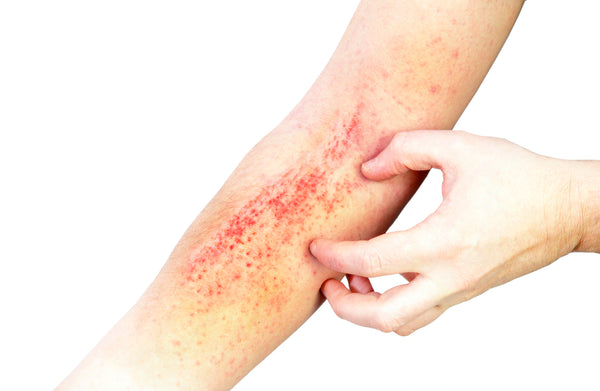Skin Care For Men: What You Need To Know
by Alec Carloss February 06, 2023
Gentlemen, it's time to take a closer look at the health and appearance of your skin. Whether it's hitting the trails, hitting the waves or just enjoying nature, your skin needs to be able to keep up with your active lifestyle. Sun, wind and environmental factors can take a toll on your skin, leaving it dry, damaged and aged. In this article we will breakdown a comprehensive guideline to an optimized men's skin care routine.
Make Skin Care a Priority

A proper skincare routine is not just for vanity but also for your overall health and wellness. Don't neglect your largest organ, nourish it and protect it. Show the world the best version of yourself by having healthy and youthful skin no matter your age or skin type.
Maintaining healthy skin has been linked to extending your lifespan as your largest organ plays a vital role in protecting your body from harmful environmental factors, regulating body temperature and maintaining hydration.
By keeping your skin healthy and moisturized, you are strengthening its ability to do its job effectively, keeping you safe from a range of health issues.
Good Skin Inspires Confidence
In addition to physical benefits, good skincare practices will also have positive impact on your emotional well-being and self-esteem. A clear, youthful-looking complexion is going to boost your confidence, allowing you to approach life with a positive attitude, which in turn, could also lead to a longer, happier life.
So, don't just think of your skincare as a luxury but rather a mandatory investment in your overall health and longevity.
A Healthy Diet is the First Step to Your Skin Care Routine

You may think that skincare is just about using the right products, but the truth is, what you put into your body can have just as much impact (if not more) as any topical product or supplement.
In terms of having a healthy diet, you should focus on consuming a variety of nutrient-dense foods that provide the necessary vitamins, minerals, and antioxidants that the skin needs to thrive.
A diet rich in fruits, vegetables, and lean proteins can provide the essential nutrients to elevate your skin health. Studies have shown that a diet high in antioxidants, such as vitamin C and E can help to reduce the effects of sun damage and protect from environmental stressors. Some of the best types of foods for maintaining healthy skin include:
-
Fruits and vegetables
Fruits and vegetables are packed with antioxidants and vitamins that can help protect the skin from damage caused by UV rays and pollution. Berries, such as strawberries and blueberries, are particularly high in antioxidants. Leafy greens, such as spinach and kale, are also great, as they are high in vitamin A, C, and K, which are all essential for healthy skin.
-
Fish
Fish, particularly salmon and sardines, are high in omega-3 fatty acids which can improve hydration and reduce inflammation. These fatty acids ca also help to reduce the risk of acne (even in acne prone skin) and eczema.
-
Nuts
Nuts are high in healthy fats, vitamin E and minerals like zinc , all of which are essential for healthy skin. Brazil nuts are a fantastic source of selenium, another mineral that has a huge positive impact on healthy skin and overall health (especially for men working on boosting their testosterone levels)
Negative Impacts of A Poor Diet

An unhealthy diet can have a detrimental impact on the condition of your skin. Consuming too much sugar, processed foods, and saturated fats will lead to negative consequences such as acne, eczema, and premature aging. These foods affect the skin by damaging your gut and other internal organs, causing chronic inflammation and other adverse health effects.
Stay Away from Soft Drinks
Soft drinks aka pop, soda, coke, etc are 100% poison to your body and cause for most skin concerns.
If you currently consume these drinks regularly, the single most impactful action you can do for your health right now is to stop.
Even if removing soft drinks from your diet is the only takeaway you get from this article, we guarantee you will notice a positive difference in your skin and overall health.
Insulin Resistance and the Skin
Pop is loaded with sugar and artificial ingredients. Too much concentrated, processed sugar in your diet will lead to insulin resistance and inflammation in a few different ways. First, when we consume a lot of sugar, our body produces a large amount of insulin, which is a hormone that helps to regulate blood sugar levels.
Studies show that, over time, when the body is constantly exposed to high levels of insulin, the cells in the body can become less sensitive to it, a condition known as insulin resistance. This can lead to higher blood sugar levels, which can increase inflammation in the body and contribute to range of chronic health conditions such as diabetes, heart disease, and obesity.
In addition to insulin resistance, sugar can also promote inflammation in the body through other mechanisms. According to research, when sugar is consumed in large amounts, it can cause an overproduction of advanced glycation end products (AGEs), which are toxic compounds that can damage cells and tissues in the body, most notably your body's largest organ.
AGEs promote inflammation and contribute to the development of chronic health conditions that deteriorate and age your skin.
Drop the pop.
Add supplements to your Skin Care Routine
In addition to maintaining a healthy diet, supplementing with certain nutrients can also significantly benefit the health and appearance of your skin. Here are some examples of effective supplements that have been shown to be beneficial:
-
Hyaluronic acid:
This is a naturally occurring compound that is found in the body. It can help to improve tissue hydration and reduce the appearance of fine lines and wrinkles, hydrate dry skin, and stimulate the proliferation of new skin cells. Check out our comprehensive breakdown of hyaluronic acid here (add hyperlink).
-
Turmeric:
Turmeric is a spice that contains curcumin, a powerful antioxidant with anti aging properties that can help to reduce inflammation and promote collagen synthesis leading to healthy looking skin.
-
Beta-carotene:
Beta-carotene is a type of carotenoid that is converted to Vitamin A in the body. It can help promote healthy cell growth and reduce the appearance of fine lines and wrinkles.
-
Ginger and Garlic:
Ginger and Garlic both have anti-inflammatory and antioxidant properties, which can help to protect tissues from environmental stressors.
-
Beetroot extract:
Beetroot extract is rich in antioxidants and nitrates that help to increase blood flow, bringing oxygen and nutrients to the skin which helps produce new skin cells for good looking skin.
-
Vitamin C:
Vitamin C is a potent antioxidant that can help to brighten and reduce the appearance of age spots and discoloration. It also helps to boost collagen production which can improve the overall health and appearance of the skin.
Caution with Men's Skincare Lotions

Be wary with regard to using most lotion skincare products as they may provide temporary relief with "soothing" ingredients but ultimately have negative long-term effects on the skin.
Topical Alcohol
One common ingredient found in many lotions and moisturizers is alcohol. Alcohol is often added to skin care products as a solvent, which helps to dissolve other ingredients and can give the product a lighter, more easily absorbed texture.
Dehydration Effect of Alcohol
However, alcohol consequentially has a powerful drying effect. This is because alcohol evaporates quickly, taking water along with it, which can leave the skin extremely dry and tight. Also, alcohol can strip away the natural oils, which can cause irritation, redness and dryness.
Leads to Oily Skin
When the skin becomes dry, it can start to produce more oil to compensate, which can lead to clogged pores and acne. Additionally, after becoming dehydrated, it can become more prone to wrinkles and fine lines.
Some Forms of Alcohol are Better than Others
It's important to note that not all alcohols are equally damaging. There are some types of alcohols that are less drying on the skin, such as fatty alcohols, which are derived from natural fats and oils, and can help to moisturize the skin.
You probably won't find these types of higher quality products in your general market/grocery store; in fact, it's best not to use any cheap conventional lotion to treat dry skin. Remember to read ingredient labels carefully and be aware of the types of alcohols that are used in skin care products.
It is also worth noting that even if a product is labeled as "alcohol-free" it may still contain other ingredients that can have a drying effect on the skin, such as astringents or exfoliants. Stick to fragrance free topicals when shopping.
Natural Barrier of the Skin
It's worth keeping in mind that we are naturally required to have somewhat oily skin as it functions as a natural protective barrier from environmental stressors, such as UV rays from sun exposure and pollution. When the skin becomes dry, this barrier can become weakened, making it more susceptible to damage. Removing the natural layer of oil will also lead to more sensitive skin.
If using topical products to moisturize the skin, its crucial that you use products formulated with ingredients that will hydrate and nourish your tissues, without striping it of its natural oils. Moisturizing ingredients like glycerin, ceramides, bees wax, royal jelly, and shea butter, can help lock in moisture, strengthen the skin's barrier and keep it hydrated.
Washing and Exfoliating
Yes, you should wash your face and body for maintaining healthy skin. However, most people take this step too far and cause far more harm than good while left wondering why their conditions continue to worsen over time.
Read the following carefully:
Over-exfoliating and over-applying acidic acne-relief products can cause real damage to the skin due to their effects on the acid mantle, which is a thin layer of acid that sits on the surface of the skin. The acid mantle helps to protect the dermis from environmental stressors and maintain its pH balance.
Maintain Optimal pH Balance
When the skin's pH balance is disrupted, it can lead to a range of problems, such as dryness, irritation, and highly sensitive skin. Over-exfoliating with harsh scrubs, or using products that contain high concentrations of acids, such as alpha hydroxy acids (AHAs) or beta hydroxy acids (BHAs) such as salicylic acid (found in your facial cleanser), can disrupt the acid mantle and cause damage to the skin.
Exfoliating is a relatively important step in your skin care routine (when done in moderation-as in not everyday), but over-exfoliating and disrupting the acid mantle that acts as a natural protective barrier will lead to inflammation, irritation, dryness, and ultimately more acne breakouts.
The skin naturally exfoliates dead skin cells on its own. Humans have been surviving with normal skin happily for tens of thousands of years without the use of acidic exfoliating products. When we over-exfoliate, we strip the skin of its natural oils, which causes a chain reaction of numerous problems. Take it easy on the salicylic acid.
Exercise

Exercise is good for every aspect of human health. As mammals, we have evolved to live a life of movement.
It is literally essential to our well being, and as you might have guessed, exercise is a fundamental component to having an effective skincare routine.
There is an abundance of scientific research to support this.
Reduces Risk of Cancer
A study published in the journal of the American Academy of Dermatology found that regular physical activity is associated with improved tissue aging and a significant reduction in the risk of contracting non-melanoma skin cancer.
Hydration and Blood Flow
Another study published in the Journal of the European Academy of Dermatology and Venereology found that regular physical activity can help improve skin hydration and reduce the appearance of wrinkles. The study showed that regular exercise helps to increase blood flow to the skin, which nourishes, repairs, and stimulate new cell production. Resulting in a more youthful and radiant appearance.
Reduces Stress
Another important aspect to exercise as it relates to the health of your precious dermis is the reduction of stress. Regular exercise can help to reduce high stress levels that cause a number of negative effects, such as causing acne, eczema, and rosacea. It's also worth mentioning that a reduction in stress will also have a positive impact on your eating habits, and as we now know, poor eating habits are synonymous to a wrecking ball on your skin's health.
A review of clinical data published in the Journal of the American Academy of Dermatology found that stress can have a significant impact on the development of acne and that regular physical activity can help to considerably reduce stress levels and improve the overall health of the skin.
Exercise Recap
To conclude on the importance of exercise, general fitness is a fundamental part of maintaining excellent skin-health, and there is plenty of scientific literature to support this. As shown by clinical data, consistent physical activity is associated with improved skin aging, a reduction in the risk of developing skin cancer, improved skin hydration, reduced appearance of wrinkles, and can help reduce stress and improve overall health.
Conclusion

An optimal skincare routine is vital for maintaining good health and appearance. Factors such as sun exposure, poor diet, soft drink consumption, and lack of physical activity can all have negative impacts on your skin. A healthy skincare routine will include protection from sun using garments and sunscreen, maintaining a healthy diet that is rich in vitamins and minerals, being mindful of potentially harmful ingredients in topical moisturizers, and to engage in regular physical activity. Furthermore, it is important to avoid over-exfoliating and over-applying acidic acne relief products as they can disrupt the acid mantle and cause damage and lead to sensitive skin.
Also in EN-1 Blog

Turmeric and Ginger Benefits
by Alec Carloss February 08, 2023

The Powerful Benefits Of Garlic For Skin Health
by Alec Carloss February 06, 2023

Why Hyaluronic Acid Supplements Should be Part of Your Skin Care Routine
by Alec Carloss January 23, 2023
Hyaluronic acid is a molecule with a variety of important functions in the body. It has shown to have remarkable benefits for the skin and joints as an oral supplement. Adding hyaluronic acid supplements to your skin care routine may be a highly effective method to improving your skin health. Find the best hyaluronic acid supplements here.
SUBSCRIBE TO OUR NEWSLETTER
Join our community and learn how you can improve your health and live a longer, more fulfilling life!
© 2025 EN-1



Alec Carloss
Author